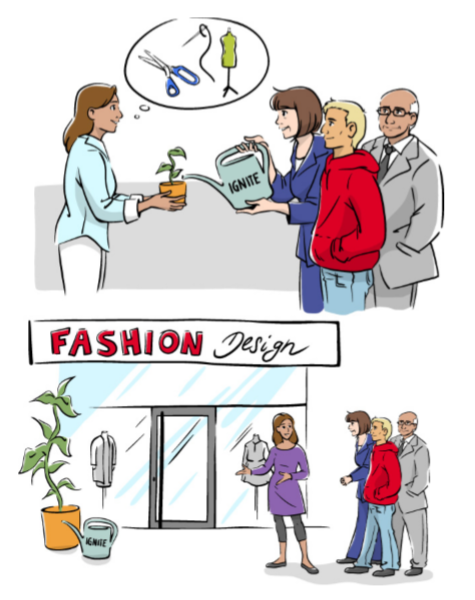
Download IQ Good Practice International as PDF
including interview with Dina Petrakis, Ignite Global Manager, Settlement Services International amme Officer at COME-Chamber of Multicultural Enterprises
Australia: Ignite Small Business Start-ups
In Australia, a three-year programme guides refugees towards entrepreneurial success, shifting the focus from their presumed shortcomings to their resilience and determination.
Starting point
As an experienced settlement country, Australia has a long-standing tradition of immigrant entrepreneurs. Among all migrants, refugees are the ones with the highest rate of entrepreneurship (Collins 2017). This is all the more impressive if one looks at the high barriers refugees face: difficulties accessing financing, weak social networks and language skills, and the longterm effects of trauma.
This apparent paradox has some good reasons. In Australia, as in most other OECD countries, refugees are more often unemployed than other migrants, and many resort to entrepreneurship after failing to find a job. Some come from countries where being one’s own boss is a common – and often preferable – way to make a living. And after having endured the harrowing experience of displacement, many are highly determined to regain control over their life.
In Germany too, the data points to remarkable potential of migrant and refugee entrepreneurs (Leicht et al 2017). But while support projects have gained momentum in recent years, refugees planning to start a business – in Australia, in Europe or elsewhere – still face manifold barriers. In Australia, this is especially true for newly arrived refugees, who lack start-up capital and have limited knowledge of local markets and regulatory intricacies. As a result, many fail in their attempt to set up shop—and many more give up before trying.
Turning passion into enterprise
In 2013, Settlement Services International (SSI), a Sydney-based nonprofit, launched Ignite Small Business Start-ups, a programme to support newly arrived refugees on their way to becoming entrepreneurs. Ignite draws inspiration from the work of Dr. Ernesto Sirolli, an Italian-American entrepreneurship expert who, in contrast with standard business-school knowledge, considers passion and determination more crucial to an entrepreneur’s success than their technical expertise. Sirolli’s model is based on trained facilitators who accompany the client on their business journey, as well as the development of a particular management structure for each business.
It soon became clear that, in order to work for refugees, this model had to be adapted to this particular cohort’s needs. Ignite facilitators, rather than just acting as intermediaries who provide links to experts and advisors, have a much more intensive and hands-on role, incorporating elements of advocacy and mentoring into their interactions with the entrepreneurs. Another key element of Ignite is the socalled Resource Team, a broad ecosystem of support. Originally limited to expertise from marketers, finance managers and other industry experts, the Resource Team grew to incorporate students from universities, retired businesspersons as volunteers, interpreters, trauma counsellors and mental health professionals. At the same time, partnerships with microfinance organisations have made it possible to grant participants loans of up to 20,000 Australian dollars (approx. 12,000 Euros).
When Ignite first started, most clients were referred to the programme by case managers working on refugee settlement. In recent years, however, word-of-mouth has led to an increasing number of refugees coming on their own initiative. Typically, Ignite facilitators identify those who are deeply committed to starting their business, and work side by side with them through a tailored approach to their business management structure. After an intensive business development phase – including, product development, consumer testing, development of a marketing strategy, adherence to compliance regulations and access to finance – clients launch their start-up. Once transactions take place and the client starts making money, the facilitation is scaled back.
Since August 2013, around 550 people have taken part in Ignite, and approximately one-fifth have started a business, in industries as diverse as photography, health and well-being, retail, and water filtration. Twelve of these small businesses have gone on to employ around 70 staff – many of whom are refugees themselves. The remaining four-fifths of participants exited from Ignite with higher level language skills, confidence, an understanding of the Australian economic environment, and skills in negotiation and continued on to employment pathways and/or education and training.
In a nutshell
In New South Wales, Australia, Ignite Small Business Start-ups has created a viable and sustainable path to entrepreneurship for refugees – the ‘most unlikely’ entrepreneurs, given their vulnerability and relative lack of resources. Ignite’s success factors include highly trained facilitators, who provide intensive personalised mentoring and advocacy assistance; a comprehensive business network of support; well-established referral pathways; mechanisms to deal with physical and mental health issues; and the programme’s relatively long duration of three years. The real centerpiece of Ignite, however, is its firm trust in refugees’ entrepreneurial potential. Next to economic and psychosocial benefits for the individual participants, estimates show that Ignite saves the government roughly $880,000 Australian dollars in social benefits every year (Collins 2017).
Target groups:
entrepreneurship mentors, chambers and business support organisations, integration practitioners and policymakers
Summary:
Ignite Small Business Start-ups helps newcomer refugees with entrepreneurial drive to develop and run a new business, thanks to intensive one-to-one facilitation and a wide network of support
Implementing organization:
Settlement Services International, a community organisation and social business that supports refugees, asylum seekers and other vulnerable groups in New South Wales, Australia.
Further reading:
Jock Collins (2017): From Refugee to Entrepreneur in Sydney in Less Than Three Years. Sydney, NSW: UTS Business School
Dr. René Leicht, Stefan Berwing, Nadine Förster and Ralf Sänger (2017): Start-up potential among people with foreign roots. Mannheim and Mainz, Germany: ifm/ism
